Course Syllabus
Course-PM
TDA342 / DIT260 Advanced functional programming lp3 vt19 (7.5 hp)
Course is offered by the department of Computer Science and Engineering
Contact details
List of...
- Alejandro Russo (Lecturer)
- Fabian Ruch (TA)
- Alejandro Gómez Londoño (TA)
-
Danny Lam
ldanny@student.chalmers.se MPSOF Jan Liu lijan@student.chalmers.se MPCAS Erik Ljungdahl ljerik@student.chalmers.se TKDAT Adam Olsson adaols15@student.hh.se MPALG Eric Wennerberg ericwe@student.chalmers.se MPALG - You need to pass all three assignments in order to pass the course.
- Each of the assignments is divided into two parts with separate deadlines.
Course-PM
TDA342/DIT260 Advanced Functional Programming HT19 (7,5hp)
Revised Dec. 28th, 2018
Departmen of Computer Science and Engineering
Chalmers University of Technology / Göteborg University
Course aim
The aim of the course is to explore the powerful mechanisms that functional programming languages offer to solve real problems and structure larger programs. The focus lies on library design and the concept of embedded languages.
Schedule
Contact details
Teaching staff
Student representatives
Course literature
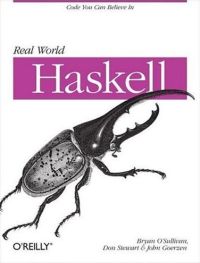 Real World Haskell by Bryan O'Sullivan, Don Stewart, and John Goerzen
Real World Haskell by Bryan O'Sullivan, Don Stewart, and John Goerzen
There is an online version of it. Some related papers to read and other material will be provided with the lectures.
Extra reading material
These books are all good but presented in order of decreasing relevance for the AFP course.
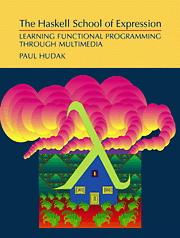 The Haskell School of Expression by Paul Hudak
The Haskell School of Expression by Paul Hudak
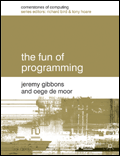 The Fun of Programming edited by Jeremy Gibbons and Oege de Moor
The Fun of Programming edited by Jeremy Gibbons and Oege de Moor
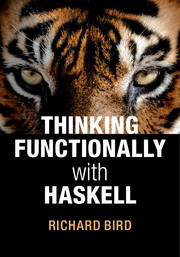 Thinking Functionally with Haskell by Richard Bird
Thinking Functionally with Haskell by Richard Bird
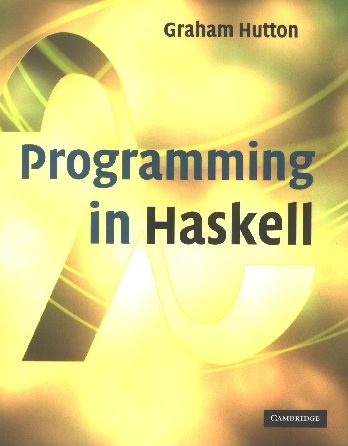 Programming in Haskell by Graham Hutton
Programming in Haskell by Graham Hutton
 Haskell — The Craft of Functional Programming
Haskell — The Craft of Functional Programming
Course design
Lectures
There are two 1.5-hour lectures every week. The students are expected to do a lot of independent programming and self-study. Lots of help is provided.
Assignments
There are three programming assignments, which you should do in pairs. If you have a good reason for doing the assignments by yourself, please contact the lecturer.
Deadlines
Examination form
Assignments
Laborations are graded with 3,4, and 5. Once you finish all the labs, you will get the following temporary grade:
tmp = (3*grade lab 1 + 5*grade lab 2 + 4*grade lab 3)/12Above, the 3,5, and 4 coefficients are the weights of the labs based on their difficulty.
To fix some round errors, the final score of the lab is:
grade_labs = (tmp - 3) * 1,4999 + 2.5Exam
The exam is graded as 3,4, and 5.
Final grade
The final grade for the course is composed of 60% for the lab's score and 40% for the exam's score.
total_grade = 0.6 * grade_labs + 0.4 * grade_examWhere the total_grade then gets rounded generously, meaning, 4.5 -> 5.
If you are a Chalmers student, then you get the score total_grade as the grade for the whole course.
GU students get G if total_grade is 3 or 4 and VG if it is 5.
Learning objectives and syllabus
Learning outcomes
- Design embedded domain specific languages (EDSLs)
- Explain and exemplify (abstract) syntax, semantics
- Implement EDSLs in Haskell (as combinator libraries)
- Read, understand and extend Haskell programs which use advanced type system features
- Type classes
- (Generalized) algebraic datatypes
- Functors, monads and monad transformers
- Use specification based development techniques
- Formulate and test properties about the program
- Reason about correctness of functional programs
- Transform programs on the basis of such reasoning
- Explain and discuss the above topics
Detailed course syllabus
Changes made since the last occasion
- Content moved into Canvas
...along with their contact details. If the course have external guest lecturers or such, give a brief description of their role and the company or similar they represent.
If needed, list administrative staff, along with their contact details.
Course purpose
Short description of the course purpose and content: can be copied from syllabus in Studieportalen. Additional information can be added.
Schedule
Course literature
List all mandatory literature, including descriptions of how to access the texts (e.g. Cremona, Chalmers Library, links).
Also list reference literature, further reading, and other non-mandatory texts.
Course design
Description of the course's learning activities; how they are implemented and how they are connected. This is the student's guide to navigating the course. Do not forget to give the student advice on how to learn as much as possible based on the pedagogy you have chosen. Often, you may need to emphasize concrete things like how often they should enter the learning space on the learning platform, how different issues are shared between supervisors, etc.
Provide a plan for
- lectures
- exervises
- laboratory work
- projects
- supervision
- feedback
- seminars
Should contain a description of how the digital tools (Canvas and others) should be used and how they are organized, as well as how communication between teachers and students takes place (Canvas, e-mail, other).
Do not forget to describe any resources that students need to use, such as lab equipment, studios, workshops, physical or digital materials.
You should be clear how missed deadlines and revisions are handled.
Changes made since the last occasion
A summary of changes made since the last occasion.
Learning objectives and syllabus
Learning objectives:
- design embedded domain specific languages (EDSLs)
- explain and exemplify (abstract) syntax, semantics
- implement EDSLs in Haskell (as combinator libraries)
- read, understand and extend Haskell programs which use advanced type system features
- type classes
- (generalized) algebraic datatypes
- functors, monads and monad transformers
- use specification based development techniques
- formulate and test properties about the program
- reason about correctness of functional programs
- transform programs on the basis of such reasoning
- explain and discuss the above topics
Link to the syllabus on Studieportalen.
If the course is a joint course (Chalmers and Göteborgs Universitet) you should link to both syllabus (Chalmers and Göteborgs Universitet).
Examination form
Description of how the examination – written examinations and other – is executed and assessed.
Include:
- what components are included, the purpose of these, and how they contribute to the learning objectives
- how compulsory and/or voluntary components contribute to the final grade
- grading limits and any other requirements for all forms of examination in order to pass the course (compulsory components)
- examination form, e.g. if the examination is conducted as a digital examination
- time and place of examination, both written exams and other exams such as project presentations
- aids permitted during examinations, as well as which markings, indexes and notes in aids are permitted
Do not forget to be extra clear with project assignments; what is the problem, what should be done, what is the expected result, and how should this result be reported. Details such as templates for project reports, what happens at missed deadlines etc. are extra important to include.
Course Summary:
| Date | Details | Due |
|---|---|---|